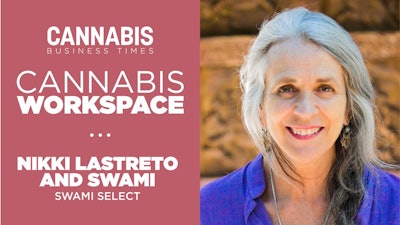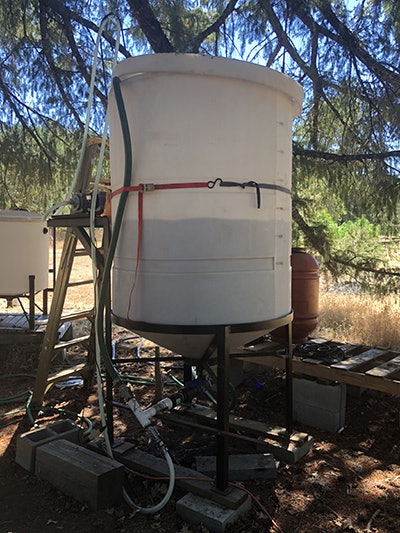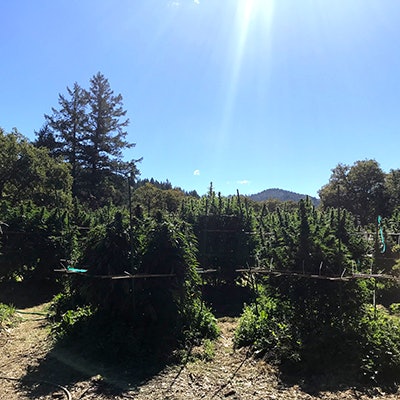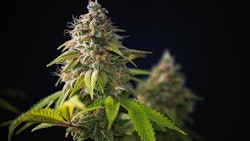
Indoor, outdoor, greenhouse or a combination: Outdoor
Can you share a bit of your background and how you and your company got to the present day?
Nikki Lastreto: We’ve been involved in the cannabis world for many, many years—in fact, decades now. Swami grew its first crop in 1978. We moved up here to Mendocino County in 2000 and we got our land in 2003. It’s just a very, very special piece of land with a lot of flat space on it up in the mountains, with our own private valley. It’s the perfect place to grow cannabis. You could not find a better place in the world.
Swami: We’ve also traveled around the world to many, many of the cannabis-culture countries—Nepal, India, Afghanistan, all the way into Thailand, Mexico, Colombia and so on. So, we really have seen cannabis cultivation all over the world and sampled it, of course, all over the world.
NL: I used to be a journalist, actually. I worked at the San Francisco Chronicle for many years and then at KRON-TV in San Francisco. I’m a native San Franciscan. And Swami was a photographer and an artist.
S: We got into cannabis because we lived in San Francisco during the summer of love. The hippie cannabis culture was born in those eras, and it’s migrated up into the Emerald Triangle in Northern California.
NL: We actually didn’t come up here in the very beginning. We were in either San Francisco or in India, and we spent a lot of time living in Asia for many years. It was when we moved back from Asia, more or less, that we ended up here in Mendocino County, and the city was a bit much after living in India, so we love it up here. We now completely call ourselves Mendonesians.
S: Starting in 2003, we’ve been judges for the Emerald Cup, which is going to happen in just a little over two weeks now. We’re still the head judges of the Emerald Cup, so that’s been part of our education, having the privilege and the responsibility of smoking literally hundreds and hundreds of samples of cannabis every year.
What tool or software in your cultivation space can you not live without?
NL: What it all comes down to [is] we couldn’t live without our solar power system. Even though we’re living here off the grid and growing as organically and sustainably as possible, there are times when you need it to run your compost tea brewer [and] to run the dehumidifiers—all of those little things that every so often we need.

Swami Select's compost tea brewer. Photo by Nikki Lastreto.
S: We live off the grid, so we can’t take everything for granted. We have to create our own electricity, we have our own septic tank/sewer system, we have our own water pump and spring system—everything we have to do ourselves. Anything you normally think is taken care of by the city, [like] picking up the garbage—all of that we have to take care of personally ourselves. And basically, the [solar power] system pumps the water and does everything. [It produces] about 60 amps. It’s not very much.
What purchase of $100 or less has most positively impacted your business in the last six months?
S: A tool that tells you how much dissolved oxygen you have in your compost tea. I think it’s about a $100 little gizmo. It tells you if your compost is aerobic or anerobic, which is a super important thing. It’s just a small, parts-per-million measurer.
What cultivation technique are you most interested in right now, and what are you actively studying (the most)?
NL: That would be the regenerative techniques that we’re using, growing in living soil as opposed to in pots.
S: Just investigating living soil and refining our compost teas. It’s R&D, it’s experimentation, and there’s all kinds of stuff online.
NL: It’s also just knowing people in the community. People share a lot of ideas. Going to conferences is how we really meet people that we do share a lot of ideas [with,] and that’s always helpful, and we learn about the new products that they offer. We try to do as much as we can from things that are on our own property, so I would say that’s definitely a highlight of our farming technique. That is because we’re very involved in something called the Appalachian Project, meaning with wine, you have your terroir that comes from your own soil. So, we try to as much as possible have everything in the soil come from our land, so we can truly call it our terroir.
How has a failure, or apparent failure, set you up for later success? Do you have a “favorite failure” of yours?
S: Every season has its crisis or its failure. So, the problem you deal with this season is not the one you dealt with last season, and it’s not going to be the one you’re going to have to deal with next season. So, basically, every season has its crisis or its failure, and sometimes you just get a really tiny crop. Sometimes the gophers come in and eat five or six plants. Sometimes somebody will get russet mites. People can lose a whole crop pretty easily. It’s a learning process, and I don’t know that there’s one that’s any more significant than another. It’s just something every year that you have to deal with.
What advice would you give to a smart, driven grower about to enter the legal, regulated industry? What advice should they ignore?
S: Don’t.
NL: No, I would say be patient.
S: Do your homework. Do your diligence. Ask people. Study up. And the other thing, the most important thing, is have fun and love your plants.
NL: And get a compliance officer.
S: One of the things we say up here is you’re not really a farmer until you sell your product. That’s the thing—there’s a whole other side of cannabis cultivation which is becoming more and more important right now, and that’s the good old American necessity of branding. If you’re going to survive as an independent farmer, everyone who’s going to do that is going to have to brand their product and make something special about it that’s an expression not only of you, but also of your farm and of your environment and how you do business. That’s your brand, and then once you create your brand, then your job is to market it because at a certain point, a small person is going to be up against these gigantic indoor grows with these huge corporations behind them, and they’ll just be able to crank out this stuff. So, you have to establish, what is your quality?
We are top shelf. We are the Cuban cigar. We’re the $100 bottle of wine. But you have to not only sell that and brand it—you also have to actually deliver. That’s why you keep your quality, you keep doing research [and] you keep making experiments to make sure you keep delivering the top-shelf quality that you claim your brand is representing. So, branding is super important, and it becomes part of what you call the culture of cultivation. Niche is a very important thing that a lot of people are throwing around right now—what is your cannabis niche that is going to give you both well-being, but also piece of mind, and is something that you enjoy doing?
NL: There’s probably a lot [that they need to ignore]. There are so many people trying to get into this business right now and they’re just making up things to do, and a lot of that stuff you don’t need. The best advice I would say is just stick to the basics. This is basically a beautiful weed that grows naturally on its own, and you don’t need all of that fancy stuff that they’re trying to sell you out there. Just grow a good and healthy plant and that’s all you need. That’s my theory.
S: We represent one actual extreme of the cannabis world, where we’re totally full-sun, full-season, we grow from seed, we hand water—we do everything what we would call “old-school.” And there are other people out there who would say the only way to grow the best cannabis is in a totally controlled environment, completely indoors, where you’re measuring everything, and you’ve got everything dialed in. Some people want indoor, but it’s such a different plant, [and] we don’t think we’re in competition with them at all. People are going to try to tell you [that] you have to do it indoors and as far as we’re concerned, that’s just the wrong advice.

Photo by Nikki Lastreto
How do you deal with burnout?
S: Smoke another joint. We just have to deal with it every day because it’s our whole lives.
NL: You put one foot in front of the other every morning when you get up. That’s life being a farmer—you’re not just farming anymore. Like we say, you’ve got to do all of these other things. Understand that you’re going to meet a whole lot of new people and experience a whole lot of new experiences coming in.
How do you motivate your employees/team?
NL: It’s not hard. I would say we motivate just because it’s such an exciting process being a pioneer in this business.
S: It’s also that we have a team of people who we’ve known for over 10 years. We’ve trained them.
NL: We don’t really have to get them excited.
S: No, they’re so natural about it. And there’s something about this plant that once you really dial into the plant itself, it really creates an amazing transformation in the people and people get kind of messianic about it. It’s something about the fact that this is a cutting-edge thing, and likewise, we realize that we’re actually making a medicinal herb. People have actually come up to us and said, “You saved our life.” I say, “What are you talking about?” [They say,] “We got some of this and all of a sudden I can deal with my thoughts and I’m not going to commit suicide.” Those are really important things, and when you have something that goes out there and people really benefit from it, it feeds all the way back and everybody gets excited, like, “Wow, this is something that’s really important and really significant.”
What keeps you awake at night?
NL: Permits and more permits.
S: Inspections by government agencies.
NL: Fish and Wildlife.
S: The government on the county, city and state level keeps coming out with new or revised regulations. There’s the Water Board, Fish and Wildlife, Agriculture, Consumer Services, Public Health. Any one of them needs a permit and inspection and so on, but then also, as they’re writing the rules, they send those out and they ask us for comment. At a certain point, I’m having to read all these rules and provide comments back for seven different agencies. At a certain point it’s like, wait a second, I just want to farm, but we have to do that because there are not many people helping us. We’re not a big corporation where we can assign someone and say, “OK, you take care of that regulation, now someone else takes care of that regulation and someone else takes care of that regulation.” We have to do it all, so it’s very overwhelming. They’ve created new internet programs for this, and we try to upload, and their programs are still working out the bugs. Everybody’s signing on the system and they crash the system, and the people writing the system and using it on the state level, they don’t understand it either. So, in some cases, we just mail it back in instead of uploading it on the computer.
What helps you sleep at night?
NL: Cannabis. I’ll eat an edible sometimes. That definitely helps me sleep.
Editor’s Note: This interview has been edited for length and clarity

























